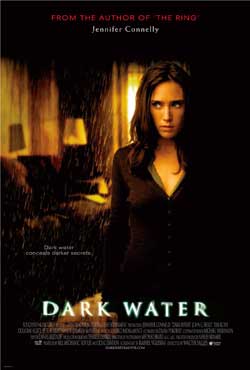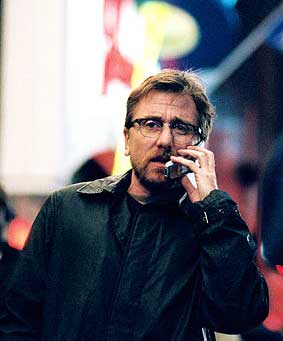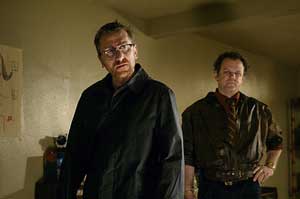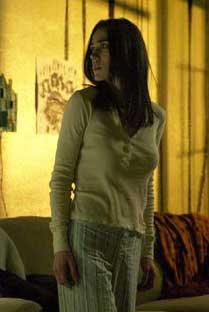 In the new horror film Dark Water, Tim Roth plays maybe the nicest screen lawyer ever. Hired by Jennifer Connelly to help her through a messy divorce, he becomes her support system as all sorts of plumbing and ghostly weirdness takes over her life.
In the new horror film Dark Water, Tim Roth plays maybe the nicest screen lawyer ever. Hired by Jennifer Connelly to help her through a messy divorce, he becomes her support system as all sorts of plumbing and ghostly weirdness takes over her life.
At the Dark Water press day here in New York City, Roth was relaxed and funny. The set up was like a mini-press conference, and in that scenario you get all sorts of less than great questions flying. I usually cut the really dopey stuff out, but this time I left a little bit of it in at the beginning to give you an idea of Roth’s sardonic wit.
Dark Water, directed by The Motorcycle Diaries’ Walter Salles and starrring Jennifer Connelly, John C Reilly and Tim Roth, opens tomorrow pretty much in every nook and cranny in the US.
Q: Do you have any apartment hunting horror stories?
Roth: No. Next question! Are we done?
Q: What appealed to you about this project?
Roth: I wanted to work with Walter. I’ve been a fan of his and we met socially and talked about directing more than anything. Then a while later he sent this over and asked if I had a fancy at taking a go at this character.
Q: When you have a character who comes into a movie halfway through, how much attention do you pay to the script before your entrance?
Roth: Oh, I’m not a moron. You have to read the script. I want to know what I’m in.
Q: Well, obviously. But does it affect your performance?
Roth: Why would it? So no, it doesn’t. It doesn’t at all.
Q: In the movie all of the adult characters lie, especially yours. He uses his lies as a shield –
Roth: I’m a bit confused about it and remain so. We did it intentionally. We tried to leave it open to the audience. On the one hand he’s really supportive of her. Whether he believes her or not, whether she’s bonkers or it’s paranoia from stress she’s going through because of the separation – he rushes out and does his homework and tries to help her as much as he can. And then he’s this lunatic with this bizarre little lying world that he’s set up.
But at the beginning she says that he lost ten years. Maybe he lost some stuff.
Q: Do you work that kind of thing out with Walter?
Roth: We both had ideas about what that might be. It’s useful to have that just for the acting purposes.
Q: It’s a striking scene when he lies about being with his family and then goes to the movies all alone.
Roth: Yeah. Yeah, it’s quite sad. Somebody said to me the other day, “What was he watching?” You fill in the blank.
I suppose it’s that thing which is thematic in the film – I haven’t seen the film but it was in the script – whether or not you’re in a highly populated place you can be completely isolated. I think some people recognize something in that.
Q: You said what interested you was Walter, but what gets you to commit?
Roth: You start with the script first. Then you go from there. The script was in good shape – it was a fair bit of writing. The characters seemed well defined and the story was clear, and what our job would be to crank up tension and run interference or red herrings or whatever. It seemed like a good yarn.
Normally you go from that to meeting the director. That can be the end of the line or it can be somebody who is intriguing to you. But that had already happened.
The next one is who is acting in it. And if that’s a scary thing you walk away, and you walk away quickly.
 Q: What would constitute a scary thing?
Q: What would constitute a scary thing?
Roth: People you think are crap. You know, when you meet with directors you’re looking at them – do I want to give this guy or this woman six months or whatever of my life? When it’s done it’s theirs – it’s a director’s medium. They do what they want with you. Do you trust them?
With actors it’s the same. If I’ve got a scene and it’s difficult stuff to do, can you do it? Can you hack it? Am I working with somebody who’s counting their close-ups or with an actor?
Q: What was your take on Jennifer Connelly?
Roth: I think she’s a proper actor. I really do. I think she’s an actor first and a movie star second. Which probably guarantees her a pretty long career.
Q: What’s your take on Japanese horror?
Roth: I haven’t seen any. I haven’t seen the original one of these, I haven’t seen The Ring. I haven’t seen them.
Q: Did you read the book at all?
Roth: No. I probably will look at some of this stuff. I have a 20 year old and he’s really into it, so he’s going to give me some stuff.
Q: How do you feel about ghost stories? Did you like them growing up?
Roth: They scared the crap out of me. Gaslight was a movie which I think is an extraordinary piece of work. Jumping up to Repulsion.
Q: Dead of Night?
Roth: I haven’t seen that one.
Q: It’s with Michael Redgrave.
Roth: Oh right! That’s a goodie! Actually, if you go back to those, go back to Hitchcock, if you went back to Psycho, I think Psycho is an extraordinary piece of work. Strangers on a Train.
But horror movies like Rosemary’s Baby and The Shining are just very, very good pieces of psychological drama with bits of the supernatural, which I think is interesting.
Q: Given that you were as supporting actor, did you have the chance to hang around and watch Walter directing?
Roth: I did. Sometimes I would hang around and watch him. Just hang out with him. We became good friends.
Q: You studied him as a director?
Roth: Yeah. We swapped ideas.
Q: In the film you’re initially unrecognizable. How much input did you have in your look?
Roth: I said I want to have a beard and I’ve got some good glasses to wear. Which after the film got run over by a taxi. Which really pissed me off! I found them in this shop and they’re from the 50s. I was going to do this film about this 1950s and 60s record producer in London, Joe Meek, who was an extraordinary  guy. We couldn’t get the money so they went off and did it as a play. But those were the glasses I was going to wear to play him and I thought, where can I put them? So I put them on this character, and I think they’re good for him. They’re really very strange. They’re nice, though. And then I was doing a play in New York and they got run over by a taxi. They fell out of my pocket.
guy. We couldn’t get the money so they went off and did it as a play. But those were the glasses I was going to wear to play him and I thought, where can I put them? So I put them on this character, and I think they’re good for him. They’re really very strange. They’re nice, though. And then I was doing a play in New York and they got run over by a taxi. They fell out of my pocket.
Q: How difficult is it to act half a phone conversation?
Roth: In this case I didn’t have to. If I was talking to Jennifer on the phone we would get Jennifer on the phone. If she was talking to me on the phone I would be there. It was a great set up. Except of course the signal’s shit. Then you’re in trouble. But no, it was great.
Q: Is there anything coming up for you?
Roth: There’s a really nice film that’s going to come out – it’s very low budget – that’s going to come out at the same time, I think, as this. It’s called Beautiful Country. Nick Nolte’s in it, Bai Ling’s in it. And this great new kid, this Vietnamese actor, Damien Nguyen.
It’s about the dilemma with the biracial kids that are the result of the Vietnam War. They were, for quite some time, treated abominably by the Vietnamese themselves. They were called Bui Doi, which means “less than dust,” and even their own families would keep them outside and feed them scraps. It’s about a kid who is one of those kids, whose father is a GI in Vietnam who vanished. It’s about his journey to try to find his father from Vietnam to America.
I play a guy whose part of his cargo is human beings. A smuggler for money.
Q: There are rumors that you’re attached to Inglorious Bastards, the next Tarantino movie. Is that true?
Roth: Good! That’s good to hear.
Me and Quentin have been talking about that film or that story either since Reservoir Dogs or since Pulp Fiction, which is really close to each other. I thought he’s going off to do something else first, but maybe he’s changed his mind. But if he wants me in it, I’m in it.
Q: Were you disappointed there was no role for you in Kill Bill?
Roth: Yeah. I wanted to play the guy with the really long mustache.
Yeah, you always want to be – he’s a mate. But you can’t be in everything of his. Don’t be ridiculous! Always the same cast. Although there were Norwegian directors who did that. But no, of course not. He’s a friend and you want to be in his stuff because it’s great. He’s fun to work with and he comes up with weird ideas. Its’ exciting.
Q: When are you directing next?
Roth: Hopefully next year. I have the script, it’s ready, I have some very good actors, now I need some money.
Q: Is it another happy film like The War Zone?
Roth: Yes, another comedy! It’s a musical this time.
Q: How do you map that out, in terms of alternating acting and directing in your career?
Roth: I have to work so I can get money to not make money. It’ll take me two years to make the film, put  it out there and finish talking about it. Then I can go back to work. So for me to direct a film – apart from getting the story, the screenplay ready, I have to work. I have to find not just jobs I want to do, which you always hope there will be more of, but you have to go out to do films that maybe you don’t believe in so much that will pay you some money. You try to do a good job on that too.
it out there and finish talking about it. Then I can go back to work. So for me to direct a film – apart from getting the story, the screenplay ready, I have to work. I have to find not just jobs I want to do, which you always hope there will be more of, but you have to go out to do films that maybe you don’t believe in so much that will pay you some money. You try to do a good job on that too.
Q: Did you get any government funding for War Zone?
Roth: No, it was Film Four. We did get 20 grand from Poland. That took care of the catering. It was a mix but the big chunk of the money came from Film Four in Britain.
Q: Will this one be easier?
Roth: No, it will be difficult because this one is set in Manhattan. They’ve priced themselves right out of the market. Maybe they’ve changed. I hope they will, because it’s really important that it’s Manhattan.
Q: I was at a screening of The War Zone where there was a heated Q&A –
Roth: With the guy? I remember him!
Q: There were a lot of people who really appreciated that film, who weren’t as upset by it. Have you met people who are thankful for the film?
Roth: Yeah. The statistics are pretty on the money. Actually, that was a funny one because that guy went a bit looney. He wasn’t public about it so much as he was a bit dramatic about it, which I found a little bit suspect. That being said, fair enough. But I was with somebody who left the film and gone next door to the bar. Because I wasn’t watching the film, I had seen it enough. He couldn’t cope with it, he had some issues. I asked if he wanted to come back and see the Q&A, it might help you a little bit. He came back with me and as we came into the cinema that guy let rip on me.
Q: An irate journalist?
Roth: An irate moviegoer. Because of the subject matter. He ripped me up. I put up my hands and calmed him down a little bit and he was fine. I went back and had another little look at him and then I walked away from him. Then the Q& A was interesting, as a consequence.
Q: He felt you shouldn’t have made a movie with the subject matter of incest?
Roth: Yes, he was deeply offended by the film. And fair enough.
Q: Are you sticking with film or do you want to get back to stage work?
Roth: I just did a play last year and I really enjoyed it. I hadn’t done it in years. I did enjoy it. I always thought the idea of directing theater is interesting because it’s quick. It doesn’t have the long laborious process of just getting to the stage of filming. You get in there, you can get your actors and you can really work. Once they’re up and running they’re up and running and you can monitor them but leave them to it.
Q: Are you planning on directing for the stage?
Roth: Just something I had been thinking about, I have nothing in mind.
Q: How does having directed affect your work as an actor?
Roth: I’m more aware of what directors go through, obviously. As a consequence I’m either more impatient if I feel they’re not living up to the job description, or I’m more patient because I know they’re having trouble. But I find myself drooling over camera equipment.